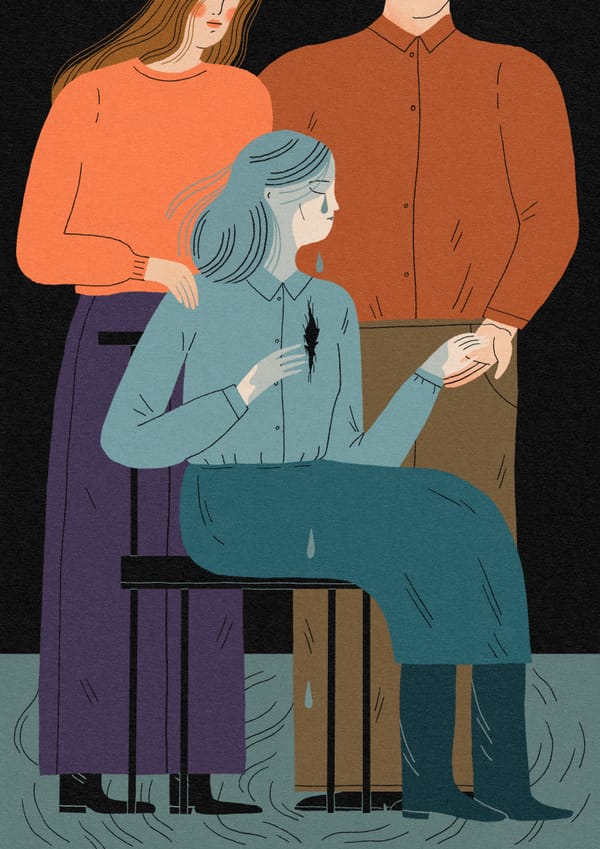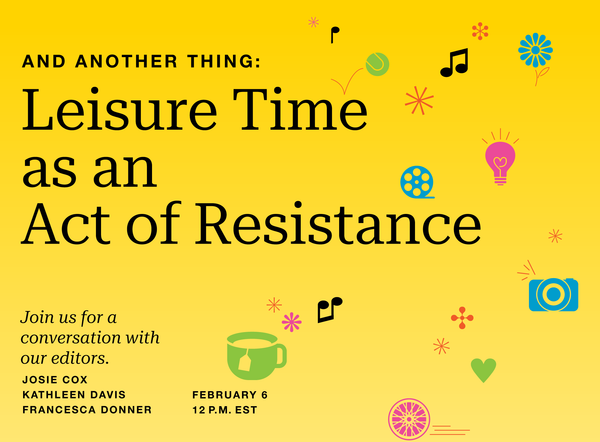The Day I Walked Out of The Kitchen
My choice is to leave all planning, preparation and worrying about food to my husband. That feels like a radical feminist act.

I moved in with the man who was to become my husband on my 23rd birthday, four and a half years after we had met. During hours of conversation about what it would be like to live together—what sort of sofa we would buy, who we would invite to parties—we had never actually discussed the division of household labor. Naively, I assumed the everyday minutiae of keeping a small apartment would just fall into place. As it turned out, washing and cleaning were no problem for me, but I quickly realized cooking is a task I hate.
Growing up, food had never been a particular priority: My mother cooked, we ate. Often weekday dinners were a variation of the same meal on consecutive days as she, in charge of a tight budget and three kids, stretched out leftovers.
My husband, however, is a foodie. In his family, every meal is a celebration: When they are together, cooking takes up large chunks of the day, beginning with everyone crowded into the kitchen and finishing hours later around the table. Before the meal, there are nibbles. After the main, there is dessert. Often, there’s a cheese course. There’s always good wine.
Our relationship was built over food: wonderful meals in neighborhood restaurants when our student loans came in; cobbled-together sandwiches in the park when they ran out. The first meal John cooked for me was tomato and anchovy pasta, and over the years, he kept on nourishing me. In our 20s, roast chickens chased away hangovers; in our 30s, green smoothies and organic vegetables reduced his sense of helplessness as we waded through the grief of infertility and IVF.
In the home, women cook so much more than men that the phenomenon has been given a name: the cooking gender gap.
During those early days of cohabitation, though, I made a point of always taking my turn to cook dinner. Sure, my cooking wasn’t as good, but I wanted him to feel cared for; I wanted to speak to him in his love language. But my husband is a culinary perfectionist, and one evening, as he hovered behind me, once again giving pointers on which way to cut the onion, I thought, “fuck this,” and I walked out of the kitchen.
Hours at the Stove Add Up
Cooking is one of life’s most time-consuming chores. It’s not just sweating in front of a hot stove; it’s meal planning and shopping and remembering which foods each kid doesn’t like right now. The average parent of two children (that is how many we now have) spends 38 hours a month shopping and prepping and cooking—that’s an hour and a quarter per day.
I don’t do any of it. To me, that feels like a radical feminist act.
In the home, women cook so much more than men that the phenomenon has been given a name by the polling organization Gallup: the cooking gender gap. In 2022, its annual survey showed the gap had widened for the first time since it began collecting data in 2018: On average, women around the world cooked 4.7 more meals a week than men, up from 4 in 2021.
The gap swings the other way in only one country: Italy, where men cook 0.4 more meals per week than women. In the U.K., men cook 0.6 fewer meals than women. In the U.S., the gap is wider: Men cook 1.7 fewer meals per week than women.
In six countries—Ethiopia, Tajikistan, Egypt, Nepal, Yemen and Algeria—the cooking gender gap is above 8, meaning that women cook almost twice as many meals as men. In Jamaica, one of the countries with the smallest gaps, men cooked more meals than women in 2021, but in 2022 it flipped, with women cooking one more meal per week than men.
Separate data shows that in professional kitchens, it’s an entirely different story: In the U.K. for example, just 18.5 percent of professional chefs are women.
Meal After Meal
My decision to opt out of cooking hasn’t come without its moments of tension.
During Covid lockdown, I struggled to suppress envy as my husband disappeared to the grocery store, one of the few government-sanctioned reasons to leave the house. But I also had to register his anxiety—returning from his trips visibly shaken by encounters with people who had come too close in an aisle, or having watched in dismay as the person ahead of him in the queue took the last bag of pasta. I half-heartedly suggested I could take over the shopping, but we both knew that wouldn’t work. I’d get the wrong cut of meat.
I half-heartedly suggested I could take over the shopping, but we both knew that wouldn’t work. I’d get the wrong cut of meat.
Meanwhile, we were weaning our firstborn, who had a dairy allergy so awful she had decided, shortly after she was born, that eating simply wasn’t her thing. In a period when there wasn’t much else for John to do—the film industry, in which he works, had all but shut down in the pandemic—the drudgery of preparing meals three times a day, seven days a week, was beginning to drain my husband’s love for cooking.
Nevertheless, by the time lockdown was lifted, John’s position in our household was cemented: He was the food guy. Today, it is his job to plan and prepare meals. Even when work means he is away—which he is, often three or four nights per week—it is up to him to ensure that the rest of the family get three meals a day, with a minimum of effort on my part. Sometimes that means batch cooking, freezing and portioning out meals at the weekend. The pressure is on.
A 2014 study published in the journal of the American Sociological Association observed 150 mothers “from all walks of life”—married, single, from different races and financial backgrounds—and their experiences around cooking, with many balancing work and “the invisible labor that goes into planning, making and co-ordinating family meals.” They found that pressure from celebrity chefs to “get people into the kitchen” and health authorities to “cook from scratch,” was leading to exhaustion and burnout. The authors said they “rarely observed a meal in which at least one family member didn’t complain about the food they were served”—all of which tended to make mothers, who were already time-poor, feel worse about their parenting.
Moreover, those with lower incomes often didn’t have a fully-functional kitchen to allow them to cook from scratch: One family only had a microwave to prepare food; others had holes in floors and walls, which made it hard to keep out pests. But contrary to assumptions that poor families eat fast food, most of the poorest moms in the study actually tried to cook as much as possible: “If I don’t cook then they’ll go get something out to eat,” said one. “But then that’s wasting money.”
‘Complicit in Our Own Oppression’
Listen, I know I come to this argument from a certain position. I have great privilege; I am straight and white. I do worry about our household finances, but not when it comes to feeding my family. I am also not in this household alone: I share childcare duties, and the person I share them with does an unusually large portion of the household labor. I have a job that allows me to care for my kids when I need to—all of which makes my life much easier than most.
But I also know that cooking is a burden shared by so many women around the world; yoked day after day to a task she doesn’t want to do. But if not her, then who?
I know it could never really happen (or could it?), but I can’t help wondering what the fallout would be if women in heterosexual relationships just… stopped cooking? Would men pick up the slack? I mean, everyone’s got to eat.
The author Eve Rodsky, whose book Fair Play provides strategies to help couples share housework, has suggested that, because of the way boys are raised, men tend to shirk household duties because they are protective of their free time (and hobbies)—and because of the expectations society places on women, women often (unwittingly) help them. In that way, “we are complicit in our own oppression,” she says.
Don’t get me wrong: I clean up after meals and I do the laundry and I get the kids up and dressed and off to school and bathed and into bed. I research parenting strategies and nap schedules and make doctor’s appointments. I organize playdates and ensure the right clothes are being worn for P.E. and forest school. And when my husband is away, I do it alone.
But because I walked out of the kitchen all those years ago, I don’t worry about meals. I don’t shop for them, I don’t cook them. I don’t wake up in the morning and think ‘what shall we have for lunch today?’ I don’t worry about whether my kids are getting the right nutrition, or that their palates aren’t sufficiently developed. Because that is my husband’s responsibility, and it’s a responsibility he takes seriously.
If all of this feels very feminist, that's because it is. But it's not about the cooking. It's because feminism at its core is about having choices. It’s about being able to say, ‘yes this, not that.’ It’s about drawing boundaries; and, in my case, taking a chore I hate and handing it off to someone who hates it a little less.





